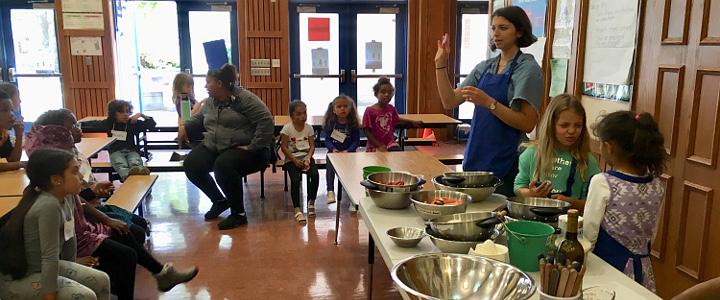Written by Katia Kupelian
Spring 2018
This spring I interned at Berkeley Unified Public School District’s Gardening and Cooking Program. I worked in the Cooking & Nutrition curriculum, which takes the form of after-school sessions; one part nutrition lesson, one part healthy hands-on cooking. I split my time between John Muir Elementary and Thousand Oaks Elementary, with kindergarten through third grade classes. After four months of “Can you go wash your hands again?” and, “Don’t yuck my yum,” here is the biggest lesson I have learned: Kids are powerful.
Power in the Classroom
Ask any teacher and they will agree, kids possess a kind of energy that is unparalleled. It is boundless and free and frenetic. Sometimes contagious, sometimes draining, but always admirable. This energy has the potential to be transformed into powerful and long-term change, especially in our food system. All it takes is a little direction in the classroom. Here is an example:
At Thousand Oaks Elementary, we taught a 2nd grader who told me she that when she grows up her dream is to become the greatest chef in the world. She was also quite energetic, chatty, and squirmy. One day when she was distracting others, I sat with her and explained how she could think of this cooking class as the first step to become a chef — a sort of kids’ training for culinary school. I went on to say that if she really wants to become the greatest chef in the world, she first has to sit and listen in class. That seemed to really resonate with her, and she was laser-focused the rest of class. This small interaction taught me how kids thrive when challenged, and a little personalized attention and guidance can go a long way.
Power to Influence Their Parents and Teachers
Kids do not only empower themselves through nutrition education; they also empower others, often without even realizing it. The program puts on regular Family Cooking Nights, in which families attend a nutrition lesson, then we all cook a meal together. I feel this is an important aspect to mention, given that the adults typically make food choices for their kids, which affect their long-term health outcomes. When the kids’ enjoyment in cooking sways their parents to come to a cooking night, the parents also benefit from the nutrition lesson, even if it is simply to remind them of how much sugar is really in a soda. Similarly, most of the teachers who help supervise during our lessons have expressed that they are learning healthy living skills too!
Power to Transform the Food System
The whole rationale behind targeting such a young age demographic with an experiential and educational approach is to tackle health using a long-term and holistic systems perspective. By exposing youth to the concepts of nutrition and healthy consumption, we are laying the groundwork for a brighter future for all. How? Firstly, our kids are our future workforce, and their health is important to the success of our country and economy. Secondly, our kids are our future consumers, and if they are aware and with their purchases, the food market will mould to meet their more ethical and environmentally responsible demands. Thirdly, our kids are our future parents, with the power to improve the health of their kids.
Although I fully believe in this approach, it is difficult to quantify the actual impact and tangible outcomes of a program of this nature. In a class of kids as young as six years old, it is doubly tough to determine just exactly how much of the material they are absorbing. Much of the time is spent on classroom management and establishing order, and many of them are reluctant to try our new foods. Frankly this aspect was something I had to adjust to. I had to shift my expectations and be fully satisfied that at the very least, exposure to health concepts and foods they may have never encountered before is significant impact enough.
Power to Change Me
As a final testament to the transformative power of children, I would like to share the ways that I have personally grown and changed through the ups and downs of this internship. The first few lessons I was quite intimidated by the authoritative role I was playing. I did not know how to best reach the kids and be viewed with respect, and I felt that they would not take my word seriously. I have learned that confidence is everything. After a few weeks of following cues from my supervisor, Vika, I found my “teacher voice.” By the end of the internship, I could successfully lead the cooking demonstrations by myself! It may seem small, but this experience has built up my confidence in my leadership and public speaking abilities. And I certainly feel more comfortable working with kids. In addition, the internship really solidified my own healthy eating habits. By emphasizing the importance of daily nutrition through whole grains, drinking water, and “eating the rainbow,” I found myself much more inclined to fall back on this knowledge when preparing food for myself.
Finally, there is something to be said about spending time around children. As a college student constantly surrounded by my own age group and older, I relished taking time during my week to tap into the minds of kids, where the world is big and interesting, and sometimes downright silly. I am grateful for this experience and it is not one I will soon forget!

